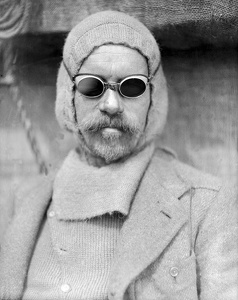Frank Wild (John Robert Francis Wild)

Frank Wild was born in Skelton-in-Cleveland, North Riding of Yorkshire, the eldest of eight sons[2] and three daughters born to schoolteacher Benjamin Wild and his seamstress wife Mary (née Cook). The family came from Skelton close to Marton, birthplace of Captain James Cook, to whom the family claimed ancestry through Mrs Wild. Her father was Robert Cook, who claimed to be a grandson of the great explorer. By 1875 the Wild family had moved from Skelton to Stickford in Lincolnshire, and in late 1880 moved again to Wheldrake near York. Wild’s family next moved to the village of Eversholt in Bedfordshire. Here his father was appointed clerk of the Eversholt Parochial Charity at Woburn. Frank Wild was educated at Bedford. He joined the Merchant Navy in 1889 at the age of 16, receiving his early training in sail in the clipper ship Sobraon. In the Merchant Navy he rose to the rank of second officer. In 1900, aged 26, he joined the Royal Navy. The 1901 census shows that at that time he was serving as an Able seaman aged 27 on HMS Edinburgh, anchored in Sheerness Harbour. As second-in-command of the Imperial Trans-Antarctic Expedition, Wild was left in charge of twenty-one men on desolate Elephant Island as Shackleton and a crew of five made their epic rescue mission to South Georgia aboard a lifeboat. From 24 April to 30 August 1916 Wild and his crew waited on Elephant Island, surviving on a diet of seal, penguin and seaweed. They were finally rescued by Shackleton aboard the Chilean ship Yelcho. Point Wild on Elephant Island is named after Frank Wild, with a monument dedicated to the Chilean captain Luis Pardo who rescued him and his men.
On returning to the United Kingdom in 1916, Wild volunteered for duty during World War I and was made a temporary lieutenant in the Royal Naval Volunteer Reserve. After taking a Russian language course, Wild became the Royal Navy’s transport officer at Archangel, where he superintended the war materials which arrived during the Allied intervention in Russia. After the war, Wild went to South Africa where he farmed in British Nyasaland with Francis Bickerton and James McIlroy, two former Antarctic comrades. From 1921 to 1922 Wild was second-in-command of the Shackleton–Rowett Expedition, a poorly equipped expedition with no clear plan, and a small ship, the Quest. Shackleton died of a heart attack on South Georgia during the expedition, and Wild took over command and completed the journey, combating unfavourable weather to Elephant Island and along the Antarctic coast. Frank Wild’s younger brother Ernest Wild also went on to become a Royal Naval seaman and Antarctic explorer, receiving a Polar Medal. Frank Wild died of pneumonia and diabetes in Klerksdorp, South Africa, on 19 August 1939, aged 66. He was cremated on 23 August 1939 at the Braamfontein Cemetery in Johannesburg.
Born
- April, 10, 1873
- United Kingdom
- Skelton-in-Cleveland, North Riding of Yorkshire
Died
- August, 19, 1939
- Johannesburg, South Africa
Cause of Death
- pneumonia and diabetes
Other
- Cremated


